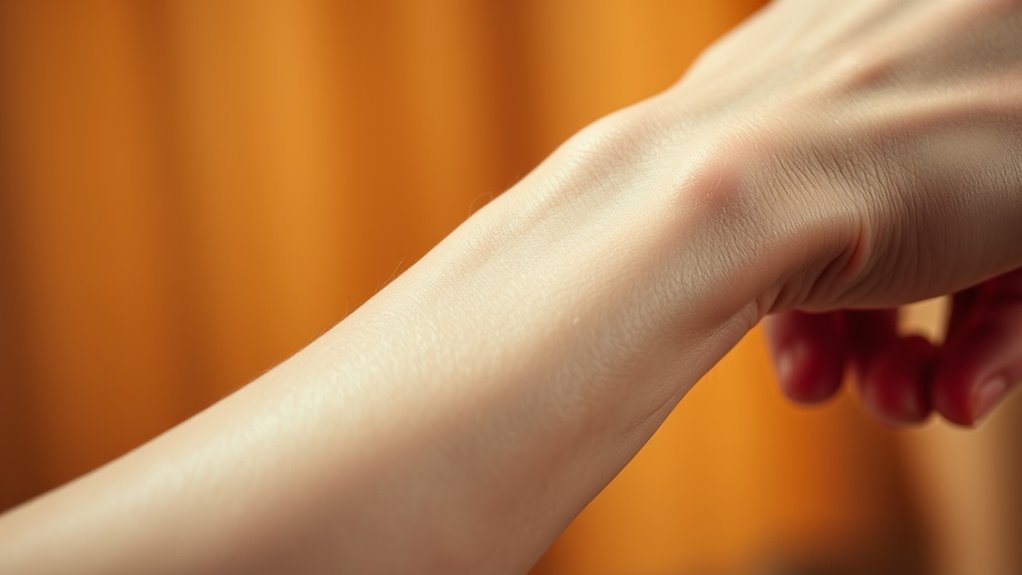If you experience muscle cramps, weakness, dizziness, irregular heartbeat, or numbness, you might be facing an electrolyte imbalance. Severe signs like confusion, seizures, or loss of consciousness require urgent care. Dehydration symptoms such as dry mouth, dark urine, and feeling sluggish also point to fluid and electrolyte issues. Watching your hydration and electrolyte intake can help. To make certain your health stays on track, keep exploring how to recognize and address these symptoms early.
Key Takeaways
- Common symptoms include muscle cramps, weakness, fatigue, dizziness, and irregular heartbeat.
- Severe signs like confusion, seizures, and loss of consciousness require urgent medical attention.
- Dehydration-related symptoms include dry mouth, dark urine, and reduced urine output.
- Maintaining electrolyte balance involves hydration, electrolyte-rich foods, and careful use of sports drinks.
- Seek medical help if symptoms worsen or indicate severe imbalance, with diagnostic testing and IV therapy as needed.

Have you ever wondered how your body keeps its fluids and signals in balance? It’s a complex process that involves a delicate interplay of electrolytes like sodium, potassium, calcium, and magnesium. When this balance is disrupted, you might experience symptoms ranging from mild discomfort to severe health issues. Recognizing these signs early is vital, as proper hydration strategies and symptom management can make all the difference in recovery and prevention.
Electrolyte imbalance can cause a variety of symptoms that may seem unrelated at first. You might notice muscle cramps, weakness, or fatigue, which are common indicators that your body’s electrolyte levels are off. Dizziness or lightheadedness, especially when standing up quickly, can also signal dehydration or an imbalance. If you experience irregular heartbeat, confusion, or numbness, these could be more serious signs that your electrolytes are dangerously out of sync. Paying close attention to these symptoms allows you to act promptly, whether that means rehydrating or seeking medical help.
Understanding how to manage hydration effectively is key to maintaining electrolyte balance. Hydration strategies involve not just drinking enough water but also replenishing lost electrolytes, especially after sweating excessively from exercise, heat, or illness. Sports drinks containing electrolytes can be helpful in these situations, but it’s important not to overconsume them, as they often contain added sugars. For everyday symptom management, incorporating electrolyte-rich foods like bananas, spinach, and dairy products can help maintain a steady balance. If you’re experiencing symptoms of dehydration or imbalance, drinking fluids with added electrolytes can help restore your body’s internal environment more quickly. Additionally, monitoring the quality of stored lemon juice can prevent the ingestion of spoiled liquids that may cause gastrointestinal discomfort, which can exacerbate dehydration. Recognizing the symptoms of electrolyte imbalance also means knowing when to seek medical attention. Mild symptoms often improve with proper hydration and dietary adjustments, but severe symptoms such as confusion, seizures, or irregular heartbeats require urgent care. In some cases, your healthcare provider may recommend electrolyte tests or IV therapy to correct severe imbalances. It’s essential to listen to your body and not ignore persistent or worsening symptoms, as untreated imbalances can lead to serious health complications.
Frequently Asked Questions
Can Electrolyte Imbalance Occur Without Noticeable Symptoms?
Yes, electrolyte imbalances can happen without noticeable symptoms, known as asymptomatic cases or silent imbalances. You might not realize there’s a problem until blood tests reveal abnormal levels. This is why routine check-ups are important, especially if you’re at risk or experiencing subtle signs. Don’t ignore minor symptoms, but understand that some imbalances can quietly affect your health without obvious warning signs.
How Does Dehydration Influence Electrolyte Levels?
Dehydration directly impacts your electrolyte levels by causing you to lose essential minerals like sodium, potassium, and chloride through sweat and urine. To combat this, you should consider electrolyte supplements and follow effective hydration strategies, such as drinking fluids with added electrolytes or consuming electrolyte-rich foods. Staying properly hydrated helps maintain your electrolyte balance, preventing imbalances that could lead to symptoms like dizziness, cramps, or fatigue.
Are Electrolyte Imbalances Common in Athletes?
Yes, electrolyte imbalances are common in athletes, especially if your hydration strategies aren’t effective. During sports nutrition planning, you need to focus on maintaining proper electrolyte levels through fluids that contain sodium, potassium, and other minerals. Proper hydration helps prevent symptoms like cramping, dizziness, or fatigue. Staying ahead with balanced electrolyte intake ensures your body functions at its best during intense activity and recovery, reducing the risk of imbalances.
Can Electrolyte Imbalance Lead to Long-Term Health Issues?
Electrolyte imbalances can lead to long-term health issues, especially if they cause chronic kidney problems or disrupt hormonal regulation. You might experience ongoing dehydration, muscle weakness, or irregular heartbeats, which can damage your kidneys over time. If left untreated, these imbalances may impair your body’s ability to maintain fluid and electrolyte balance, increasing the risk of serious health complications. It’s essential to address imbalances promptly to protect your long-term health.
What Are the Best Ways to Prevent Electrolyte Imbalance?
You can prevent electrolyte imbalance by staying ahead of the game with proper hydration strategies and dietary modifications. Drink plenty of water, especially during hot weather or intense exercise, and include electrolyte-rich foods like bananas, spinach, and yogurt in your diet. Avoid excessive alcohol and caffeine, which can dehydrate you. By consistently maintaining these habits, you’ll keep your electrolyte levels balanced and your health thriving—nothing less than a powerhouse!
Conclusion
If you notice symptoms like dizziness or muscle weakness, don’t ignore them—your electrolytes could be out of balance. For example, imagine feeling faint after a hot day without drinking enough water; your body might be signaling dehydration and electrolyte loss. Staying aware of these signs helps you act quickly, preventing more serious issues. Keep hydrated, listen to your body, and seek medical advice if symptoms persist. Your well-being depends on balancing those electrolytes!










